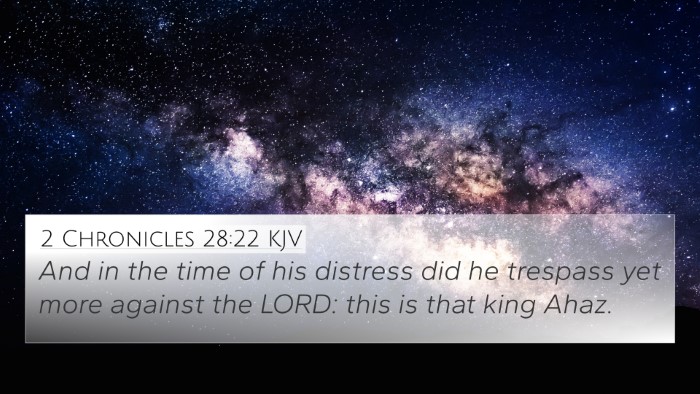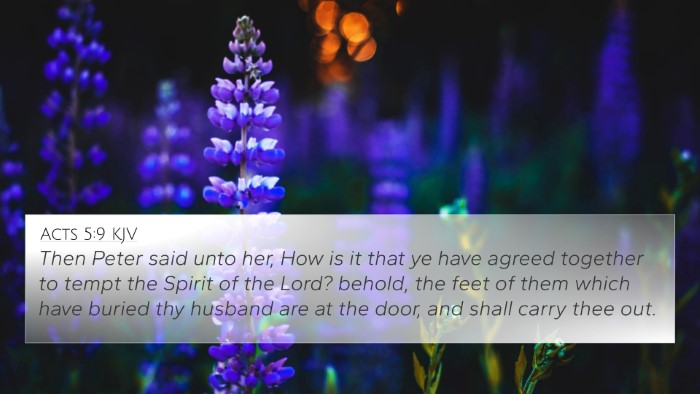Understanding Isaiah 7:12
Bible Verse: Isaiah 7:12 - "But Ahaz said, I will not ask, neither will I tempt the LORD."
Verse Summary
In this verse, King Ahaz of Judah refuses the divine offer given by the prophet Isaiah to request a sign from God. His response indicates a lack of faith and a desire to appear pious, masking his underlying fear and doubt.
Interpretation Insights
- Matthew Henry's Commentary: Matthew Henry points out that Ahaz’s refusal to ask for a sign reveals his unbelief and unwillingness to depend on God's assurance. He was more concerned about political maneuvers than trusting God's providence.
- Albert Barnes' Notes: Barnes emphasizes that Ahaz’s statement reflects a superficial reverence. He suggests that Ahaz was aware of his need yet chose to reject God's help, which reflects a broader theme of human pride and skepticism toward divine assistance.
- Adam Clarke's Commentary: Clarke elaborates on the background of Ahaz’s situation, explaining that his fear of invasion from Israel and Syria led him to distrust God. His conscious choice to reject a sign highlights the grave consequences of turning away from divine guidance.
Key Themes
This verse encapsulates significant themes within the biblical narrative:
- Lack of Faith: Ahaz’s refusal not only illustrates personal incredulity but also serves as a cautionary tale about the dangers of failing to trust in God's promises.
- The Consequences of Ignoring God's Signs: By refusing a sign from God, Ahaz exposes himself and the kingdom to potential disaster, illustrating how the lack of receptivity to divine guidance leads to spiritual and earthly peril.
- Pride vs. Humility: Ahaz’s decision reflects pride; he wanted to handle his circumstances without God’s help, contrasting the humility necessary for reliance on divine wisdom.
Related Bible Verses
Isaiah 7:12 connects with several other scriptures, reflecting themes of faith, divine communication, and God's promises. Notable cross-references include:
- Isaiah 7:10-11 - God’s urge to Ahaz to ask for a sign.
- James 1:5 - Asking God for wisdom reflects a heart ready to receive from Him.
- Matthew 4:7 - Jesus’ response to temptation shows the importance of not testing God.
- Proverbs 3:5-6 - Trust in the Lord fully aligns with the call to faith rather than skepticism.
- Romans 14:23 - The principle of acting in faith versus doubt.
- Hebrews 11:6 - Faith is necessary to please God, contrasting Ahaz's approach.
- Isaiah 30:15 - Trusting God leads to strength and salvation, revealing Ahaz’s missed opportunity.
- 2 Kings 16:1-4 - This passage provides historical context about Ahaz’s kingship and choices.
- Malachi 1:14 - Honoring God and His name versus showing indifference, akin to Ahaz’s attitude.
- Luke 10:16 - The weight of resistance against divine message parallels Ahaz’s response.
Application of Cross-Referencing
Utilizing tools for Bible cross-referencing can deepen one’s understanding of scripture. Here are some essential methods:
- Bible Concordance: A comprehensive Bible concordance provides entries of significant words, allowing for thematic connections across verses.
- Cross-reference Bible Study: Engaging with cross-references enhances comprehension, creating a network of understanding that reveals the interconnectedness of biblical messages.
- How to Use Bible Cross-references: By examining cross-referenced themes, one can gain insights into the continuity of God’s message from the Old Testament through the New Testament.
Conclusion
Isaiah 7:12 serves not only as a historical account but also as a timeless reminder of the importance of faith in God’s provisions. This verse and its cross-references encourage believers to reflect on their own responses to God’s guidance and the broader context of His word.









